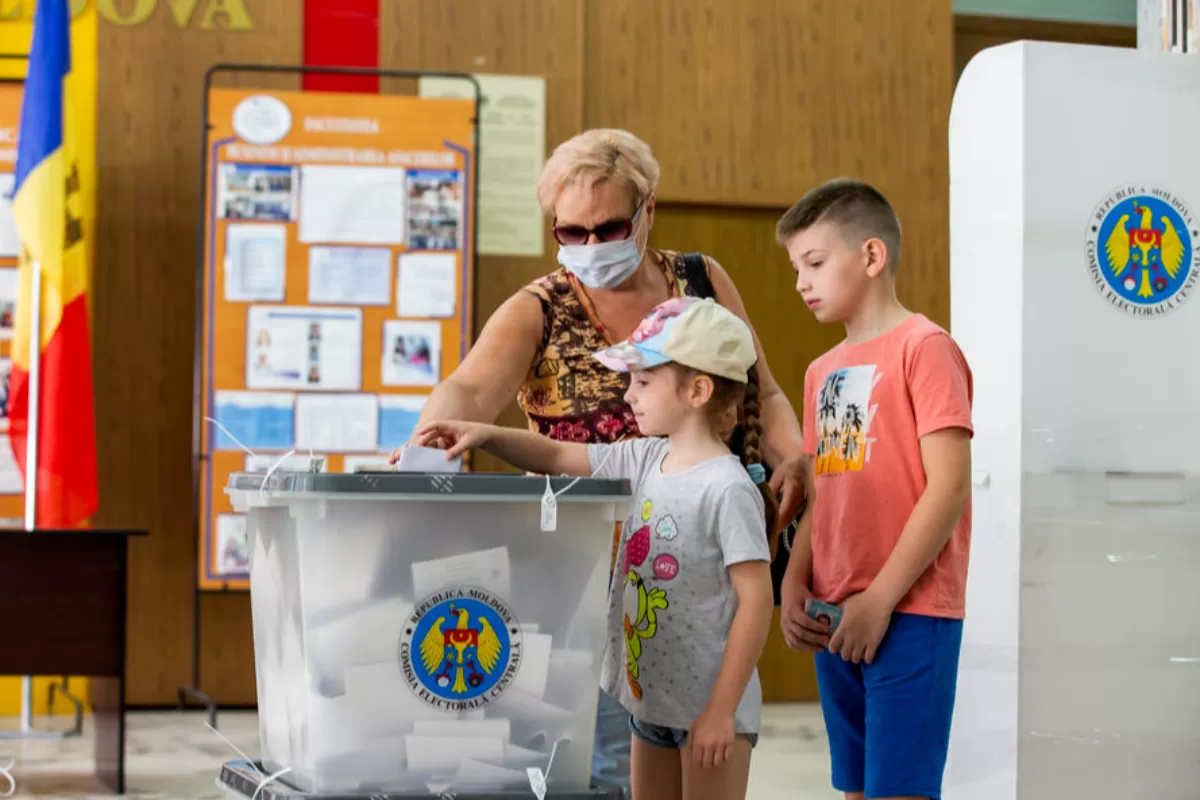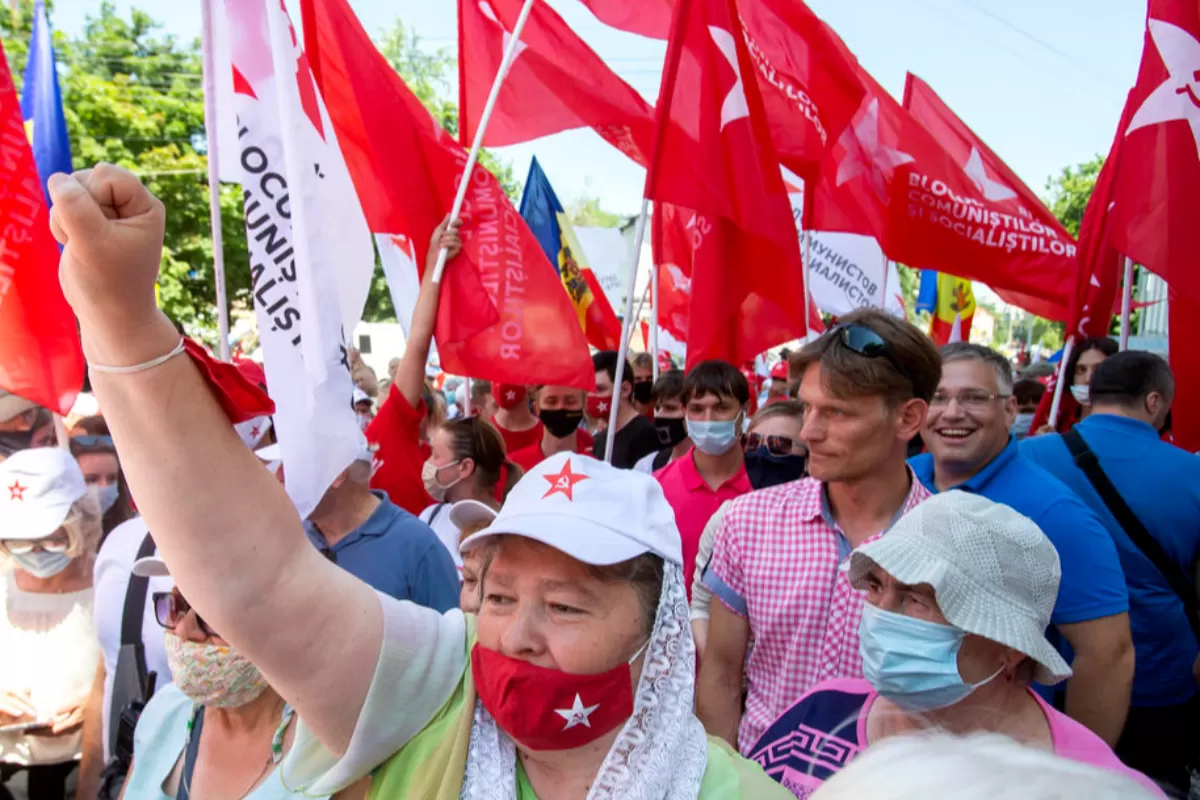
Not even the most optimistic supporters of the Action and Solidarity Party (PAS) were expecting a landslide victory in the early parliamentary election. PAS didn’t just face left-wing parties, represented by the Electoral Bloc of Communists and Socialists, but Russia itself, which tried to lend the latter a helping hand. Yet its victory is only the beginning: the real challenge for PAS lies ahead.
Defeat for Russia
PAS marched on to victory, obtaining 52.80% of the total of nearly 1 and a half million votes, of which some 212.000 were cast in the Diaspora. This accounts for 63 of the total of 101 seats in Parliament. The rest went to the Electoral Bloc of Communists and Socialists (32) and Shor Party (6 seats), led by wanted billionaire Ilan Shor.
The result is extraordinary, marking the first time in the history of the Republic of Moldova when a center-right pro-European party gets such a good score and secures a comfortable majority in the Parliament in Chișinău.
It is also a bitter defeat for pro-Russian left-wing forces in Chișinău, and, by extension, a blow dealt to Russia’s influence and direct interests in this country.
But let’s look into every aspect one at a time, and explain the steps that led to this defeat which gives a more faithful representation of Moscow compared to its overinflated image in ex-Soviet space, including in the Republic of Moldova, where it projects itself as an all-mighty force.
There is a plethora of instruments whereby Russia exerts its influence in Chișinău, from its subservient propaganda media, to oligarchs doing business with Russia and a breakaway region turned militarized platform for smuggling and other activities. Despite all that, Moscow could only achieve so much in this round of election.
Some voices claim Russia didn’t want to get involved in the game too much, and preferred to watch from the stands, without talking to the coach or making any substitutes.
In reality, Moscow did get involved. A lot. From propaganda TV stations to flooding social media with fakes, Russia used its entire arsenal of manipulation. Even at top level, the visits to Moscow of Socialist Parliament Speaker, Zinaida Greceanîi, with Igor Dodon’s name penned down on the list of Moldovan delegates, was supposed to boost their numbers in the election campaign. Not to mention the creation of the Electoral Bloc of Communists and Socialists (BeCS), with the blessing of Kazbek Taisaev, an MP in the Russian State Duma.
Moreover, the Russian MFA’s official statements, presented by its spokesperson, Maria Zakharova, who condemned the so-called “Western interference in Moldovan internal affairs”, further fueled symbiotic relations between BeCS and the Kremlin.
All that struggle was for nothing, and disaster finally struck the left-wing in the Republic of Moldova in the current election.
Last but not least, the Alliance for the Union of Romanians (AUR) boosted the political and media reputation of BeCS, while its actions and populist approach have done a great disservice to its unionist aspirations.
Following the incidents at the Varnița border crossing point and the recent brawl in front of the PSRM headquarters with the “Young Guard” of Socialists and the “titushkys” enrolled at Nicolae Pascaru’s sports club (athletes associated with organized crime, e.n.), AUR’s actions put the party into Moscow’s crosshairs during the campaign.
On the one hand, this mobilized pro-Russian voters, fueling into BeCS’s rhetoric, according to which “Romanians are coming to occupy our country”, while on the other hand, AUR turned the unionist cause into a laughing stock, gaining a reputation that will hardly go away. From both prospects, AUR’s actions were utterly detrimental to center-right political parties in the Republic of Moldova, also marring the image of Romania in Moldova.
Once the afterglow of success has faded, PAS will have to face a series of major challenges. It will have to pass its greatest test yet, namely showing that is a down-to-earth party with a robust ideology, a partner for president Maia Sandu and not a political tool.
PAS will have to steer clear of all the mistakes of the recent past, when the Socialists had the power reigns, Igor Dodon was president and leader of the Parliament majority and of the puppet cabinet led by Ion Chicu.
It won’t be an easy job, although PAS rests on a comfortable majority of 63 seats in Parliament. PAS is very close to obtaining full power in Moldova, which might also spell a series of inconveniences in the future, not just political benefits. First of all, this power also comes with great responsibility that weighs heavily not just on PAS’s shoulders, but also on Maia Sandu.
The kleptocracy that has reigned supreme in Chișinău in the three decades of independence won’t go away too easily. It will hide behind a powerful bastion of affluent businessmen and corrupt magistrates. PAS leaders lack the stomach to cut out this cancer. Although the time of oligarchs like Vlad Plahotniuc or Ilan Shor seems to be over in the Republic of Moldova, the kleptocracy they left in their wake will give rise to new leaders emerging from that critical mass of people who have been living off the system for years.
Apart from this fierce battle, PAS will have an equally hard time fighting a corrupt judiciary, taken over by a deeply-rooted hard core.
The external evaluation of magistrates will also be a difficult task for Maia Sandu and PAS. This class of privileged magistrates will insist on separating state powers, using this argument to call for political non-interference in the justice system. Should it succeed, it will be an instrumental shield for the corrupt and oligarchs.
It will be a battle fought in the trenches, and this bastion won’t be easy to take. In the other camp, pressure will be mounting swiftly as people will want quick results. Moldovan citizens want to see the new Government taking swift action, and the PAS Parliament majority will need to deliver on its promises both to the masses, as well as to the country’s development partners, to show that reforms are working. Much depends on this, including financial assistance from the West that may very well compensate the social and economic agenda promised by PAS.
Therefore, PAS needs a well-oiled mechanism with no margin for error.
To succeed in its undertakings, PAS needs experts. Evidence of that can be found in the fairly recent history of the Republic of Moldova. The communists’ coming to power in 2001 proved that success is not easily managed. Kolkhoz tractors turned deputies overnight. Eventually, the leader of the communist party himself admitted it was hard to govern in the absence of people specializing in key areas that require special attention.
Against the backdrop of a growing brain drain, but also faced with a shortage of specialists opting for more lucrative and applied sectors, PAS will inevitably have to deal with the severe scarcity of its ranks. There are a number of fairly obscure people on PAS’s party lists who climbed the party ladder more or less due to their loyalty.
Therefore, Maia Sandu and PAS need to consider from the very outset a policy that should appeal to the best experts in the field, and even provide jobs to people in the area of civil society or other parties that failed to meet the electoral threshold. One good move would be for PAS to think about swiftly recruiting specialists from the Dignity and Truth Platform (PPDA), who might achieve good results in a number of sensitive areas.
Furthermore, considering PAS won 63 seats in the new Parliament and doesn’t have an elected president, there are certainly various camps within the party that will back a certain candidate for this position at the future congress. PAS shouldn’t be a monolith party like PSRM, where the formal or informal leader dictates everything. To be a genuinely European party, PAS needs political pluralism if it is to succeed.
Another strength, which can equally become a weakness, is the young age and political crudeness of many of PAS’s new MPs. Political life in the Republic of Moldova is still a struggle, less democratic and closer to processes seen in ex-Soviet space. It won’t be easy for the young new-comers to quickly acquire the necessary experience in order to deal with these challenges.
Moreover, there is a temptation that a number of bills should skip the process of debate and be swiftly adopted, without allowing the opposition the possibility of expressing itself, thus taking advantage of the comfortable majority in Parliament.
Last but not least, the new Cabinet structure should rely on a very careful selection of the new team, one that shouldn’t observe party interests, but rather thorough selection criteria.
To conclude, PAS needs to stay anchored in the here and now and continue on the path of modesty. The taste of power can corrupt even the most virtuous of men. In that respect, let us remember that the Liberal-Democratic Party (PLDM) and its leader, Vlad Filat, had built a team which many had pinned their hopes on, but which eventually failed, infatuated by its own power.
PAS needs to be Maia Sandu’s partner, not her subordinate, and the balance of state powers should be maintained to avoid any deviations. The Socialists and the Communists will do their best to speculate every mistake and skillfully exploit every crack and weakness that reformist forces will leave uncovered.

Disinformation uses a variety of manipulation tactics. Disinformation stories can easily be created by combining provocative topics.
Report
FAKE NEWS: The right-wing bought votes in the Diaspora
The alleged election fraud, including bribe-giving, was one of the hot topics in the Republic of Moldova on election day. While media outlets siding with pro-European parties revealed alleged cases of bribe reported on the left bank of the Dniester, the pro-Socialist press focused on offenses reported abroad. One the main “arguments” about influencing voters in the Diaspora was a short video filmed by a young girl queuing outside a polling station in Frankfurt, Germany. In the background one can hear a few people talking and laughing, mentioning 50 Euro. A large number of press institutions affiliated to the Socialists carried the piece of news, suggesting the video is evidence that voters got bribed. The person who shot the video subsequently said it was all a joke, and that the media made erroneous assumptions.

DEMAGOG 2021. The Chisinau Report, No. 5: Radio Yerevan
disinformation, manipulative stories and fake news continued to flood the media as usual. Maia Sandu, PAS and the West were again the favorite targets of disinformation and fake narratives. Fake news authors were pretty much unimaginative, as they have been over the course of the entire campaign, resorting to narratives they used before, both in the current campaign, as well as in previous ones: a victory for the right-wing would spell disaster for the country

Much like most other election campaigns in the Republic of Moldova, this summer’s campaign for the parliamentary election of July 11 was ridden with disputes which, at times, went way beyond the limits of common decency. We’ve seen controversial figures getting the spotlight, a great deal of disinformation, and we’ve had our fair share of extraordinary and laughable moments. Foreign policy was, once again, a major topic of debate. Less than 30 years since Moldova proclaimed its independence, it’s still unclear whether the country is headed West or East. Another recurring theme in this campaign was the fight against corruption, which has been discussed for years, without seemingly rooting out the weed of corruption that has spread to the point of nearly suffocating the whole country. Veridica has reviewed some of the topics, episodes and characters that grabbed the headlines during this election campaign.